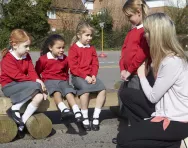TheSchoolRun.com closure date
As we informed you a few months ago, TheSchoolRun has had to make the difficult decision to close due to financial pressures and the company has now ceased trading. We had hoped to keep our content available through a partnership with another educational provider, but this provider has since withdrawn from the agreement.
As a result, we now have to permanently close TheSchoolRun.com. However, to give subscribers time to download any content they’d like to keep, we will keep the website open until 31st July 2025. After this date, the site will be taken down and there will be no further access to any resources. We strongly encourage you to download and save any resources you think you may want to use in the future.
In particular, we suggest downloading:
- Learning packs
- All the worksheets from the 11+ programme, if you are following this with your child
- Complete Learning Journey programmes (the packs below include all 40 worksheets for each programme)
You should already have received 16 primary school eBooks (worth £108.84) to download and keep. If you haven’t received these, please contact us at [email protected] before 31st July 2025, and we will send them to you.
We are very sorry that there is no way to continue offering access to resources and sincerely apologise for the inconvenience caused.
How to help a shy child

Every parent wants to raise a confident child. But for some children, shyness and social anxiety has a big impact on their school life, affecting everything from friendships to academic achievement.
‘Sometimes shyness is genetic, and sometimes it’s learned behaviour, so shy parents may have children who are also shy,’ explains parenting expert Anita Cleare, founder of The Positive Parenting Project. ‘Sometimes it’s down to a lack of practice: children can’t learn social skills from a book; they have to get in amongst other children and try them out.’


Start a unique learning programme!
- Weekly programme for each school year
- Worksheets sent direct to your inbox
- Keeps your child's learning on track
But shyness doesn’t have to blight your child’s school years. ‘Shy children can learn to be confident in social situations,’ says Anita. ‘They may have fewer friendships, or take a bit longer to form them, but being shy doesn’t necessarily mean a poorer outcome for your child.’
So how can you help your shy child cope with social situations that they find difficult?
‘My child doesn’t have any friends’
Although it’s hard to watch your child struggling to form friendships, being shy doesn’t mean they’re destined to be lonely. ‘In the long term, there’s no real disadvantage to being shy in terms of forming friendships,’ says Anita. ‘In fact, children who hang back and observe rather than jumping into a group often have a really good sense of empathy.’
A good strategy for the child who appears to have no friends is to ask them which three classmates they’d like to spend time with; you can then invite these children over to play, one at a time and for short periods initially. ‘Spending time with another child in their own environment is a great way to practise social skills,’ explains Anita.
If playtimes are lonely for your child, encourage them to use the friendship bench, if their school has one: a place where kids can go if they need company. ‘Schools also have buddy or mentor schemes where the shy child is looked after by a classmate or an older child; this has benefits for both children,’ Anita adds.
‘My son goes to a couple of lunchtime clubs, which help him get to know other kids,’ says Judy, mum to Lucas, 10.
‘My child is being overlooked in class’
Sometimes, it can feel as if the children who shout the loudest are always called on in class, to the detriment of shy, quiet kids. ‘But teachers are very good at noticing when children are being overlooked, and making sure every child has a chance to contribute,’ says Anita.
If you’re worried that your child is being passed over, have a word with the teacher. They should be happy to discuss ways to make them feel involved without putting too much pressure on them: for example, they may not like speaking up in class, but be happy to voice their opinions in small group activities.
You could also set your child small but realistic challenges – like putting their hand up once a day at first – and reward them with praise or a sticker chart if they succeed.
‘My child hates going on playdates’
Playdates can be a source of extreme anxiety for a shy child, especially if they’re going to someone else’s house. Anita advises following your child’s lead in terms of what they’re comfortable with. ‘Playdates are really good for children, but if they don’t want to go to someone else’s house, that’s fine; they can come to yours,’ she says.
Alternatively, you could accompany your child on playdates, or meet up with friends on neutral territory, like the park. ‘It’s all about providing opportunities they feel comfortable with,’ Anita adds.
‘We have lots of playdates for our twins, who struggle a bit socially,’ says Madeleine, mum to seven-year-olds Jamie and Grace. ‘They breed familiarity and ease around a range of kids that wouldn’t exist without the effort.’
‘My child won’t go to parties without me’
Although it’s frustrating to be the only parent at a party where every other kid has been dropped off, it’s important to let your child be the judge of whether they can handle the situation alone.
‘If your child is clinging to you and won’t join in, that’s fine, but don’t make it a rewarding experience by making a fuss of them; just carry on as normal, chatting to other parents or drinking your cup of coffee,’ Anita advises. ‘But if they do go off – even if it’s just a few metres away – make a big deal of praising them. Focus on when they’re getting it right, rather than pushing them more than they’re comfortable with.’
‘My daughter gets unsettled by arriving at the same time as a big crowd, so we ask if we can get to parties a few minutes early so she can adjust,’ says Alex, mum to six-year-old Leila.
‘My child is too dependent on their best friend’
Many parents worry about their child being too reliant on one friend. It can seem like they have all their eggs in one basket; what will happen if that child gets bored with them, or moves away?
However, Anita believes that having one strong friendship can be a good thing. ‘Children do need to practise social skills in lots of different situations: one to one, in small groups, in big groups, with older children, with younger children and with adults,’ she says. ‘But having a strong friendship with one other child is a good way for them to practise these skills with someone they feel comfortable with.’
If you’re worried that your child is too dependent on their friend – for example, if their friend bosses them around, or if your child gets upset when they’re absent from school – you can gently encourage other friendships, but don’t try to discourage the relationship, as this can cause a lot of anxiety.
‘My child doesn’t want to go on their school trip’
‘Shy children can be slower to branch out from the family, and can feel very challenged by being away from their home environment,’ Anita explains. This can make school trips – particularly residentials – extremely daunting.
‘If you push a child who’s feeling anxious, the danger is that they’ll become more anxious, so it’s important to let them lead the way,’ Anita says. So if they’re worrying about their school trip, you might agree with the teacher that they can go for the first day, then come home if they want to, or that they’re allowed a quick phone call home each evening.
‘Often, once they’ve found their feet, they find they can do more than they expected,’ Anita says. ‘But listen to their opinions: they may be shy, but being able to say what they do and don’t feel capable of shows real confidence.’
‘My child doesn’t like joining in with playtime games’
Playtimes can be a challenge for shy children. Plucking up the courage to join in with playground games may be difficult, and they may prefer calm and quiet activities to boisterous games of football or tag.
Most playgrounds have areas for children who don’t want to race around, so if your child would rather be drawing or reading than playing team games, encourage them to use this space; chances are they’ll find other likeminded children there. Schools often have play leaders who will encourage all children to get involved with playtime activities, too.
After-school clubs can also help your child to strike up friendships with others who share the same pastimes: the child who feels left out at school because they don’t like playing football may well find a sense of belonging at a computing club or book group.
‘My child is being bullied because they’re shy’
Sadly, shy children are sometimes a target for bullies. ‘My son was bullied because he didn’t fit in with the norm; he preferred to draw anime at break times than play football,’ says Christine, mum to 11-year-old Tommy.
All schools must have an anti-bullying policy, so if your child is being picked on, ask to see it and follow the advice on how to report it. In addition, you can equip your child with strategies to respond to the bullying. ‘It’s a good idea to give them a little script: something they can do and say in a difficult situation,’ Anita says. ‘It can be as simple as saying, “Please stop, I don’t want you to do that,” and going to find a friend or adult.’
Nine strategies to tackle shyness
1. Don’t label your child. Referring to them as ‘the shy one’ can become a self-fulfilling policy.
2. Model confident behaviour. Let your child see you talking to other people, making eye contact and voicing your opinions, even if this doesn’t come naturally.
3. Give them opportunities to practise, for example by going to clubs, playdates, family get-togethers, the park, and so on.
4. Set manageable goals: talking to one person at playtime is more realistic than joining in with a noisy game of basketball.
5. Celebrate their achievements. Recognise when they’ve stepped out of their comfort zone and give lots of praise.
6. Be prepared to stay with them. Parties and playdates may be more tolerable for your child if you’re nearby.
7. Don’t push too hard. Forcing your child into uncomfortable situations could cause more harm than good.
8. Give them opportunities to succeed, whether that’s by helping the teacher water the classroom plants or taking up a musical instrument.
9. Know when to seek help. ‘If their anxiety is getting in the way of a normal childhood, speak to their teacher or make an appointment with the GP to see how they can be helped,’ Anita says.








